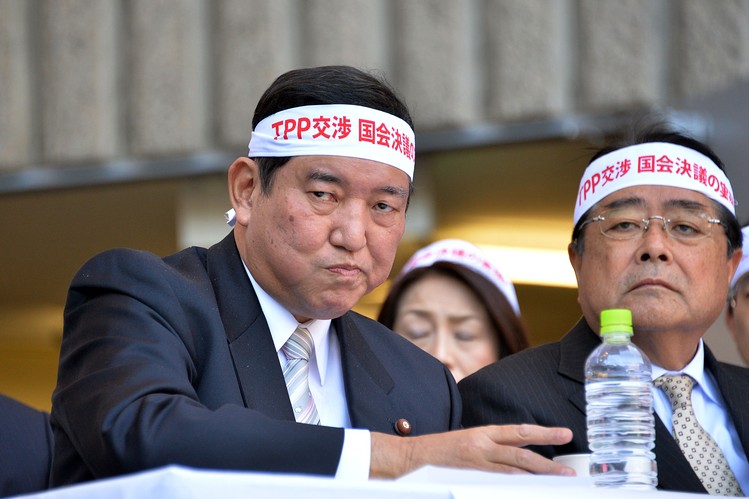Ruling coalition gives up trying to pass TPP-ratifying bill after minister’s gaffe

The Japan Times | 2 November 2016
Ruling coalition gives up trying to pass TPP-ratifying bill after minister’s gaffe
by Tomohiro Osaki
After a new round of calls for the resignation of Japan’s gaffe-prone agricultural minister, Prime Minister Shinzo Abe’s ruling coalition on Wednesday gave up trying to pass a bill to ratify the Trans-Pacific Partnership agreement through a special Lower House committee.
The failure by the Liberal Democratic Party-Komeito coalition to adopt the bill at the committee tasked with TPP deliberations — a key step toward its passage through the Lower House plenary session — compromised Abe’s effort to win domestic approval of the multinational deal before the U.S. presidential election on Tuesday.
With U.S. presidential nominees Hillary Clinton and Donald Trump both opposed to the deal, Tokyo was desperate to pass the bill through the Lower House plenary session before Election Day. Such a decisive legislative step, the government hoped, would send a powerful message that Japan has no intention of accepting a request for renegotiations from the U.S. side.
“If we keep idling away our time, it could prompt calls for renegotiations,” Abe told the TPP committee Monday.
The bill had been almost certain to clear the TPP committee Wednesday before reports emerged that farm minister Yuji Yamamoto had made the frivolous remark at a party the previous night that his earlier TPP-related gaffe was meant to be just a “joke.”
“I was almost fired when I made that joke,” Yamamoto was quoted by media as telling the audience in an apparent attempt at humor.
While attending an Oct. 18 party organized by Tsutomu Sato, chairman of the Lower House Committee on Rules and Administration, Yamamoto had blurted out, “It’s up to Mr. Sato to decide whether to forcibly pass the bill.”
Yamamoto’s undemocratic suggestion that the TPP bill could be steamrolled through the Diet immediately ignited the ire of opposition lawmakers, recalling an earlier blunder by a different LDP lawmaker who said in September that he wanted to realize the “forcible” passage of the bill.
On Wednesday, Chief Cabinet Secretary Yoshihide Suga told a regular news conference that he had rebuked Yamamoto for the insensitivity of his latest comment, while seeking to play down his responsibility.
“He is deeply sorry for what he said, and I don’t think his resignation is necessary,” Suga said. He then reaffirmed the government’s position that the TPP is “essential” to Japan’s growth strategy and called for the deal’s swift enactment.
Until Wednesday morning, the LDP had hoped to have the bill adopted at the TPP committee later the same day, before sending it to the ruling coalition-controlled Lower House plenary session on Friday for an eleventh-hour approval.
The bill’s Friday passage through the Lower House would have all but guaranteed its enactment during this ongoing Diet session, which is currently scheduled to end on Nov. 30, but which could be extended at least until early December.
A constitutional rule stipulates that a Lower House-approved bill on international treaties automatically clears the Diet after 30 days even without the backing of the Upper House.
The opposition bloc, including the Democratic Party and the Japanese Communist Party, quickly seized on Yamamoto’s faux pas and agreed to petition the LDP for his resignation.
“I take his comment very seriously,” Goshi Hosono, deputy president of the DP, said, calling it “unsuitable” for him to remain minister. The audacity of his remark, he said, “clearly shows the arrogance of the LDP.”
Meanwhile, a collective sigh of relief erupted outside the Diet building before noon on Wednesday as the news emerged that the ruling bloc had given up on the adoption of the bill by the committee.
About 50 protesters from labor unions and agricultural cooperatives braved the autumn wind as they staged a sit-in and shouted slogans, arguing that TPP will destroy food safety, increase layoffs, lower wages and only benefit big companies.
“With our rice price on the decline, Japanese agriculture is already struggling. An influx of foreign rice will further dent the price, which would devastate our business,” Toru Yamaguchi, 43, from an agricultural cooperative in Ibaraki Prefecture, said.
“No wonder young people shun agriculture,” he added.





